Reformed Commentary Bundle (194 vols.)
Digital Logos Edition
Overview
Enhance your Bible study and build your library with a wealth of Reformed scholarship available at one low price. This collection of favorite commentaries combines contemporary works with time-tested classics, resulting in a well-rounded armory of insight, explanation, and application for every book of the Bible.
Explore the intricacies of Scripture with John Calvin, Matthew Poole, John Owen, Matthew Henry, R.C. Sproul, and more top Reformed thinkers from across the years. Pick up valuable volumes from the Pillar New Testament Commentary, New International Greek Testament Commentary, Mentor Commentary, and other trusted series.
Gathering favorite Bible study companions from the Reformation to the present day, this comprehensive collection features acclaimed exegetical, expositional, and homiletical commentaries to equip pastors, scholars, students, and laity.
For even more Reformed Bible study resources, check out the Reformed base packages!

- Combines top Reformed commentaries from across the centuries
- Gathers expositional, exegetical, devotional, and homiletical commentary
- Provides insight, explanation, and application for every book of the Bible
- Title: Reformed Commentary Bundle
- Volumes: 194
- Pages: 85,069
- Christian Group: Reformed
- Resource Type: Commentaries
This title is included in the following collections
You can save when you purchase this product as part of a collection.
Logos 8 Ultimate Legacy Librar...
$21,749.99$21,749.99
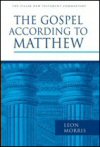
The Pillar New Testament Commentary: The Gospel according to Matthew
- Author: Leon Morris
- Publisher: Eerdmans
- Publication Date: 1992
- Pages: 765
In the Christian Church the Gospel of Matthew has been considered the most important portrait of Jesus’ life and message. Containing Jesus’ Sermon on the Mount and a uniquely rich collection of parables, among many other things, Matthew has made a major contribution to the church throughout the centuries, and it still has much to say to the church today.
This superb commentary in the Pillar series explores the meaning and relevance of Matthew in an eminently straightforward fashion. Leon Morris writes for readers who use commentaries to discover further what the Bible means. Throughout, he makes clear what he considers to be the meaning of the Greek text that Matthew has bequeathed to the church. A perceptive introduction precedes Morris’s warmhearted verse-by-verse exposition of Matthew, an exposition based on his own literal translation of the text. Now a standard reference work on the Gospel of Matthew, this mature, evangelically oriented commentary will continue to meet the needs of students, pastor, and general readers alike.
For more details on this resource, see here!
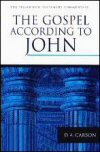
The Pillar New Testament Commentary: The Gospel according to John
- Author: D.A. Carson
- Publisher: Eerdmans
- Publication Date: 1991
- Pages: 1,452
In this solid evangelical commentary on John’s Gospel, a respected Scripture expositor makes clear the flow of the text, engages a small but representative part of the massive secondary literature on John, shows how the Fourth Gospel contributes to biblical and systematic theology, and offers a consistent exposition of John as a evangelistic Gospel. The comprehensive introduction treats such matters as the authenticity, authorship, purpose, and structure of the Gospel.
For more details on this resource, see here!
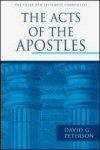
The Pillar New Testament Commentary: The Acts of the Apostles
- Author: David G. Peterson
- Publisher: Eerdmans
- Publication Date: 2009
- Pages: 848
Fifteen years in the making, this comprehensive commentary by David Peterson offers thorough exegesis and exposition of the Acts of the Apostles, drawing on recent scholarship in the fields of narrative criticism and theological analysis. It incorporates insights into historical-social background, and investigates why Luke presents his material in the way he does.
In view of how long the book of Acts is—over a thousand verses—Peterson’s commentary is admirably economical yet meaty. His judgments, according to Don Carson, are always "sane, evenhanded, and judicious." Even while unpacking exegetical details, Peterson constantly scans the horizon, keeping the larger picture in mind. With its solid exegesis, astute theological analysis, and practical contemporary application, Peterson’s Acts of the Apostles is a commentary that preachers, teachers, and students everywhere will want and need.
For more details on this resource, see here!
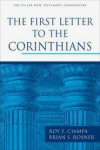
The Pillar New Testament Commentary: The First Letter to the Corinthians
- Authors: Roy E. Ciampa and Brian S. Rosner
- Publisher: Eerdmans
- Publication Date: 2010
- Pages: 960
This thorough commentary presents a coherent reading of 1 Corinthians, taking full account of its Old Testament and Jewish roots and demonstrating Paul’s primary concern for the unity and purity of the church and the glory of God. Roy Ciampa and Brian Rosner’s well-informed, careful exegesis touches on an astonishingly wide swath of important yet sensitive issues, reinforcing the letter’s ongoing theological and pastoral significance.
For more details on this resource, see here!
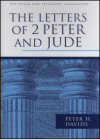
The Pillar New Testament Commentary: The Letters of 2 Peter and Jude
- Author: Peter H. Davids
- Publisher: Eerdmans
- Publication Date: 2006
- Pages: 348
Filling a notable gap in scholarship on 2 Peter and Jude, Peter Davids artfully unpacks these two neglected but fascinating epistles that deal with the confrontation between the Greco-Roman world and the burgeoning first-century Jesus communities. Davids firmly grasps the overall structure of these oft-maligned epistles and presents a strong case for 2 Peter and Jude as coherent, consistent documents. Marked by exceptional exegesis and sharp, independent judgments, Davids’ work both connects with the latest scholarship and transforms scholarly insights into helpful conclusions benefiting Christian believers.
For more details on this resource, see here!

Mentor Commentary Series
- Series: Mentor Commentary
- Publisher: Mentor
- Volumes: 16
- Pages: 8,232
The Mentor Commentary Series combines a high view of Scripture with insights from the latest academic theological research. This unique combination allows the reader to see what recent scholarly research has discovered without losing sight of the inerrancy of Scripture. Uncover the meaning of Scripture, and clarify its relevance for your life today. Grasp the significance of the Bible for our times. And discover the richness of Scripture with detailed commentary, thorough exegesis, and probing questions on literary, interpretive, and contextual issues.
These important commentaries are essential tools for sermon preparation, and for students and scholars of the Bible interested in literary, exegetical, and interpretive questions. Although they discuss textual, linguistic, and grammatical issues, they do so using English, making them accessible for English-only study. Detailed footnotes, a bibliography, and subject and author indexes make each volume a useful starting point for further research on a particular book of the Bible.
Titles included:
- Exodus by John L. McKay
- Leviticus by Robert I. Vasholz
- 1 & 2 Chronicles by Richard Pratt
- Ezra & Nehemiah by Tiberius Rata
- Psalms, vol. 1 by Allan Harman
- Psalms, vol. 2 by Allan Harman
- Proverbs by John A. Kitchen
- Jeremiah, vol. 1 by John L. MacKay
- Jeremiah, vol. 2 by John L. MacKay
- Lamentations by John L. MacKay
- Hosea by John L. Mackay
- Joel & Obadiah by Irvin Busenitz
- Amos by Gary Smith
- Matthew, vol. 1 by Knox Chamblin
- Matthew, vol. 2 by Knox Chamblin
- Galatians by David McWilliams
For more details on this collection, see here!
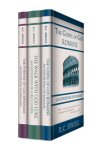
R.C. Sproul Exposition Collection
- Author: R.C. Sproul
- Publisher: Christian Focus
- Volumes: 3
- Pages: 860
R.C. Sproul has been called the master teacher of this generation. As the author of over forty books and a syndicated radio teacher Sproul has earned the respect of his peers as a premier bible expositor and proponent of Reformed theology. The R.C. Sproul Exposition Collection presents three exegetical works combining scholarly analysis of the biblical text and intense devotional insight and power as only R.C. Sproul can do. In the R.C. Sproul Exposition Collection, you benefit from keen perceptions as you walk through Luke’s Gospel and Paul’s epistles to the Romans and the Ephesians.
Titles included:
- The Purpose of God: An Exposition of Ephesians
- Walk With God: An Exposition of Luke’s Gospel
- Gospel of God: An Exposition of Romans
For more details on this collection, see here!

Calvin’s Commentaries
- Author: John Calvin
- Publishers: Calvin Translation Society and Westminster John Knox Press
- Volumes: 46
- Pages: 22,455
Calvin’s Commentaries are, in the words of Philip Schaff, one of the few exegetical works that have outlived their generation. Calvin preached and wrote prolifically on the Bible. His commentaries display a rare combination of exegetical insight, pastoral concern, and theological depth which have inspired generations of Christians. Calvin wrote commentaries on most books of the Bible, and is best known for his commentaries on the Pauline epistles, his harmony of the Gospels, and his five-volume work on the Psalms—all included in this massive collection.
Titles included:
- Calvin: Commentaries
- Commentaries on the First Book of Moses Called Genesis, vol. 1
- Commentaries on the First Book of Moses Called Genesis, vol. 2
- Commentaries on the Four Last Books of Moses, vol. 1
- Commentaries on the Four Last Books of Moses, vol. 2
- Commentaries on the Four Last Books of Moses, vol. 3
- Commentaries on the Four Last Books of Moses, vol. 4
- Commentaries on the Book of Joshua
- Commentary on the Book of Psalms, vol. 1
- Commentary on the Book of Psalms, vol. 2
- Commentary on the Book of Psalms, vol. 3
- Commentary on the Book of Psalms, vol. 4
- Commentary on the Book of Psalms, vol. 5
- Commentary on the Prophet Isaiah, vol. 1
- Commentary on the Prophet Isaiah, vol. 2
- Commentary on the Prophet Isaiah, vol. 3
- Commentary on the Prophet Isaiah, vol. 4
- Commentaries on the Prophet Jeremiah and the Lamentations, vol. 1
- Commentaries on the Prophet Jeremiah and the Lamentations, vol. 2
- Commentaries on the Prophet Jeremiah and the Lamentations, vol. 3
- Commentaries on the Prophet Jeremiah and the Lamentations, vol. 4
- Commentaries on the Prophet Jeremiah and the Lamentations, vol. 5
- Commentaries on the Prophet Ezekiel, vol. 1
- Commentaries on the Prophet Ezekiel, vol. 2
- Commentaries on the Prophet Daniel, vol. 1
- Commentaries on the Prophet Daniel, vol. 2
- Commentaries on the Twelve Minor Prophets, vol. 1: Hosea
- Commentaries on the Twelve Minor Prophets, vol. 2: Joel, Amos, Obadiah
- Commentaries on the Twelve Minor Prophets, vol. 3: Jonah, Micah, Nahum
- Commentaries on the Twelve Minor Prophets, vol. 4: Habakkuk, Zephaniah, Haggai
- Commentaries on the Twelve Minor Prophets, vol. 5: Zechariah and Malachi
- Commentary on a Harmony of the Evangelists: Matthew, Mark, and Luke, vol. 1
- Commentary on a Harmony of the Evangelists: Matthew, Mark, and Luke, vol. 2
- Commentary on a Harmony of the Evangelists: Matthew, Mark, and Luke, vol. 3
- Commentary on the Gospel According to John, vol. 1
- Commentary on the Gospel According to John, vol. 2
- Commentary on the Acts of the Apostles, vol. 1
- Commentary on the Acts of the Apostles, vol. 2
- Commentary on the Epistle of Paul to the Romans
- Commentary on the Epistles of Paul to the Corinthians, vol. 1
- Commentary on the Epistles of Paul to the Corinthians, vol. 2
- Commentaries on the Epistles of Paul to the Galatians and Ephesians
- Commentaries on the Epistle to the Philippians, Colossians, and Thessalonians
- Commentaries on the Epistle to Timothy, Titus, and Philemon
- Commentaries on the Epistle of Paul to the Hebrews
- Commentaries on the Catholic Epistles: 1 Peter, 1 John, James, 2 Peter, Jude
For more details on this collection, see here!
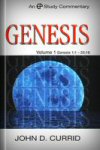
A Study Commentary on Genesis, Volume 1: Genesis 1:1–25:18
- Author: John D. Currid
- Publisher: Evangelical Press
- Publication Date: 2003
- Pages: 500
Genesis is a book about beginnings—the creation of the universe, the formation of mankind, the establishment of the covenant, and the founding of the people of Israel. Many Christians regard the Old Testament as merely a collection of interesting stories to be taught in Sunday school, but which have little application for the church today except as providing examples or illustrations from a bygone, almost barbarous, age.
The truth is that almost every important church doctrine is found in “seed” form in the book of Genesis—creation, fall, redemption, the doctrine of the Trinity, the promise of the Messiah, the establishment of the covenant, and the hope of the resurrection are all to be found here. A “seed” is planted in Genesis and then it sprouts and grows throughout the rest of the Bible until it finds its fruition in the person and work of Jesus Christ. God created the universe; it fell through the sin of humanity; and now God is in the process of redeeming it through the work of Christ. This latter work continues even now until the time of the end when all things will be put in their final place.
Dr. Currid provides solid exegesis in an accessible way, matched with practical application that displays the relevance of this Old Testament book for the twenty-first century. This volume covers the period from the creation up to the death of Abraham and the marriage of Isaac and Rebekah.
For more details on this resource, see here!
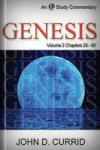
A Study Commentary on Genesis, Volume 2: Genesis 25:19–50:26
- Author: John D. Currid
- Publisher: Evangelical Press
- Publication Date: 2003
- Pages: 432
At the beginning of Scripture, the Holy Spirit, through the prophet Moses, introduces us at once to God in the essential fullness of his being. It is to God and God alone that we are brought. We hear him, through the divine revelation, penetrating earth’s silence, shining into the primordial darkness, with the sole intent of creating a sphere in which he might display his sovereignty, incomparability, and power. Unlike too many recent scholarly works on this book that have concentrated on the formation and development of the Pentateuch, John Currid is concerned to focus on the content and theology of this first book of the Bible. Indeed almost every important church doctrine is found in “seed” form in the Book of Genesis. This volume covers the lives of the patriarchs Jacob and Joseph, ending with the Israelites living in Egypt.
For more details on this resource, see here!

A Study Commentary on Job
- Author: Hywel R. Jones
- Publisher: Evangelical Press
- Publication Date: 2007
- Pages: 304
The book of Job has been highly spoken of by many, both inside the Christian church and out. Thomas Carlyle, the nineteenth-century man of letters, wrote of it, “I call it, apart from all theories about it, one of the grandest things ever written with pen. . . . There is nothing written, I think, in the Bible or out of it, of equal literary merit.” Martin Luther described it as “magnificent and sublime as no other book of Scripture.”
As a part of Holy Scripture, it is imbued with a far higher inspiration than any one of the world’s great classics. By it, God aims to instruct and encourage his people in their earthly pilgrimage towards heaven, just as he does in all the other books of the Bible. But the breadth of its appeal should not be forgotten. Set outside the life of Israel, the book of Job provides a ready-made point of contact with unchurched people. There are so many who have lost their way, either because they do not ask the big questions about life, or because they are swamped by the fact that there seem to be no real answers to them. By its presentation of both the grim realities of human existence and the wonder of divine grace, the book has something to say to any who would consult it seriously. It therefore supplies excellent material for lively and relevant preaching to people of every culture, not only by way of edification, but also evangelism. This commentary is written partly in the hope that such preaching will take place.
For more details on this resource, see here!
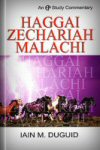
A Study Commentary on Haggai, Zechariah and Malachi
- Author: Iain Duguid
- Publisher: Evangelical Press
- Publication Date: 2010
- Pages: 255
The last three books of the Old Testament, Haggai, Zechariah, and Malachi, have not always received the attention they deserve from the church. This is in some ways surprising, since the Gospel writers quote Zechariah 9–14 more often than any other biblical source in explaining Christ’s sufferings and death.
One reason for the tendency to neglect these three books lies in the fact that they address a community who were living in a day of small things, with little glory and no great triumphs to show off to a watching world. In a day like ours, which puts such a premium on charismatic leaders whose ministries exude glory and success, they may be viewed as something of an embarrassment.
But if, like the apostle Paul, we are content to be broken vessels without glory in ourselves so that the glory of Christ crucified may be all the more plainly displayed, then we shall find much blessing in these books. In them, we shall read of the comfort and challenge that come from the presence of the living God in our midst, even when his glory is not on public display. In them, we shall also read of the anticipation of the day when the glory of God would come to earth in the person of Christ and bring about the long-promised salvation of his people.
For more details on this resource, see here!
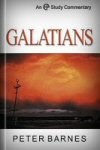
A Study Commentary on Galatians
- Author: Peter Barnes
- Publisher: Evangelical Press
- Publication Date: 2006
- Pages: 368
Of all Paul’s letters, the epistle to the Galatians is undoubtedly his most fiercely worded, more so even than the two Corinthian letters. The problem in the churches in Galatia was that they had heard the Gospel from the great apostle Paul, but then proceeded to modify it. A little poison in the cup may be all that is needed for the cup to be toxic. To be specific, the Galatians began to listen to the Judaizers who were telling them that they needed to be circumcised, keep the Jewish holy days, and, by implication, maintain Jewish food laws which prevented them from eating with gentiles.
It is well-known that the epistle to the Galatians played a highly significant role in the sixteenth-century Reformation, and Martin Luther was to refer to it as “my own Epistle, to which I have plighted my troth.” He thought that “This doctrine can never be taught, urged, and repeated enough.” Galatians takes us to the very heart and core of the message of God to us in Jesus Christ. Ultimately, its message is simplicity itself: law condemns, Jesus saves. This is a message which the modern evangelical world needs to hear in a new and fresh way.
For more details on this resource, see here!
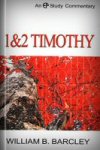
A Study Commentary on 1 and 2 Timothy
- Author: William B. Barclay
- Publisher: Evangelical Press
- Publication Date: 2005
- Pages: 315
If we were to take a poll of modern Christians and ask them what they think are some of the key issues facing the church today, what would be on that list? Certainly it would include things like, what is at the heart of the ministry of the church? How should women participate in the church? How important is the preaching ministry of the church, and what should the church’s preaching look like? How much diversity can we allow in the teaching and preaching ministry of the church? What is the church’s responsibility to the poor? What type of leadership should the church have? Who should occupy positions of leadership? What should the worship of the church entail?
The questions of today are not all that different from the questions the church wrestled with in the middle of the first century. And the good news is, Scripture has answers to these questions. In particular, the apostle Paul deals with these issues as he writes his two letters to his friend and coworker, Timothy. He may not treat them as exhaustively as we might like. He may not give specific answers to all of our modern questions. But he gives us guidance in wrestling with many of the problems and struggles that face the church today.
For more details on this resource, see here!
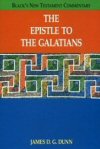
Black’s New Testament Commentary: The Epistle to the Galatians
- Author: James D.G. Dunn
- Publisher: Hendrickson
- Publication Date: 1993
- Pages: 400
Paul's letter to the Galatians may be the boldest exposition of the Gospel and one of the best examples that Paul's theology first and foremost emerged within the framework of a living community. James D. G. Dunn's sensitivity to the letter's larger flow of thought and his adept hand at guiding us through the sometimes murky waters of Paul's thought combine to make this commentary refreshingly accessible and eminently serviceable. With a penetrating but never pedantic analysis, Dunn opens Paul's letter to the troubled believers in Galatia with a skill that comes only with knowing the subject exceedingly well.
For more details on this resource, see here!

Lectures on the Epistle to the Romans
- Author: Ralph Wardlaw
- Publisher: Fullarton Co.
- Volumes: 3
- Pages: 1,228
Lectures on the Epistle to the Romans is a three-volume collection of lectures and sermons by Ralph Wardlaw. These lectures began as sermons to Scottish congregations, and over his life, Wardlaw refined them for eventual publication. After his death, these 71 lectures were compiled and edited by his son, J.S. Wardlaw.
Wardlaw’s astute exegesis is thought-provoking as well as comprehensive, with each lecture covering the biblical text verse by verse through the entire book of Romans. Though Christ’s time on earth was documented in the Gospels, Wardlaw contends that essential Christian doctrines also exist outside of those four books. He demonstrates that Romans is key to any personal understanding of Christ and his work.
Titles included:
- Lectures on the Epistle to the Romans, vol. 1
- Lectures on the Epistle to the Romans, vol. 2
- Lectures on the Epistle to the Romans, vol. 3
For more details on this collection, see here!

Lange’s Commentary on the Holy Scriptures
- Author: John Peter Lange
- Volumes: 63
- Pages: 14,814
Lange’s Commentary on the Holy Scriptures offers enduring commentary on the entire Bible that combines scholarly precision with rich insights for application. Originally edited by Peter Lange in Germany, Philip Schaff supervised the English translation and contributed substantially to the American edition—regarded as the definitive version of these classic commentaries. Also included in this collection is the important volume covering the Old Testament Apocrypha, often left out of more recent reprints. Complete with comprehensive introductions and critical notes, as well as its acclaimed exegetical, theological, and homiletical commentary, this standard series continues to be a great guide for pastors, scholars, students, and laity.
Titles included:
- Genesis
- Exodus
- Leviticus
- Numbers
- Deuteronomy
- Joshua
- Judges
- Ruth
- 1 & 2 Samuel
- 1 Kings
- 2 Kings
- 1 & 2 Chronicles
- Ezra
- Nehemiah
- Esther
- Job
- Psalms
- Proverbs
- Ecclesiastes
- Song of Solomon
- Isaiah
- Jeremiah
- Lamentations
- Ezekiel
- Daniel
- Hosea
- Joel
- Amos
- Obadiah
- Jonah
- Micah
- Nahum
- Habakkuk
- Zephaniah
- Haggai
- Zechariah
- Malachi
- Matthew
- Mark
- Luke
- John
- Acts
- Romans
- 1 Corinthians
- 2 Corinthians
- Galatians
- Ephesians
- Philippians
- Colossians
- 1 & 2 Thessalonians
- 1 & 2 Timothy
- Titus
- Philemon
- Hebrews
- James
- 1 Peter
- 2 Peter
- 1, 2, 3 John
- Jude
- Revelation
- General Introduction to Minor Prophets
- Index to the Volumes of Lange’s Commentary on the New Testament
- Apocrypha
For more details on this collection, see here!
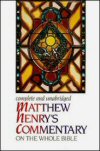
Matthew Henry’s Commentary on the Bible
- Author: Matthew Henry
- Publisher: Hendrickson
- Publication Date: 1996
- Pages: 2,485
Matthew Henry had the rare ability to express profound spiritual insights with simplicity and eloquence. He dedicated his life to explaining the Bible so that people could live in light of its teaching. Over the years, his writings have been read for both their scholarship and devotion, and none more than the classic Commentary on the Whole Bible. Now you can read the very best of Matthew Henry in this new edition of his famous commentary.
A valuable source of reference and sermon material with a clear modern typeface, this classic is complete and unabridged—a treasure for pastors, students, Bible teachers, and devotional readers alike.
For more details on this resource, see here!

Matthew Poole’s Commentary on the Holy Bible
- Author: Matthew Poole
- Publisher: Robert Carter and Brothers
- Publication Date: 1853
- Volumes: 3
- Pages: 3,069
Matthew Poole was one of the most influential Puritan ministers and thinkers of the seventeenth century. A Protestant clergyman in England during a time of religious persecution, he fled the country due to threats of assassination. Poole was known as a devoted Christian, full of integrity and perseverance, in addition to being a great theologian and writer. His commentary series has been a standard for over four hundred years and continues to be a trusted resource for pastors and laity. Poole’s exposition offers insight into the entire Bible, verse-by-verse. He includes a brief introduction and summary for each chapter of the Bible, as well as each book. Poole’s commentary is characterized by questions and answers, cultural context, historical impact, and cross-references. He provides practical and readable information, highly applicable for pastors or anyone looking for more context and information for their study of Scripture.
Titles included:
- Volume 1
- Volume 2
- Volume 3
For more details on this collection, see here!

Poor Man’s Old and New Testament Commentary 12 vols.
- Author: Robert Hawker
- Volumes: 12
- Pages: 7,981
Charles Spurgeon exhorted his students, “Gentlemen, if you want something full of marrow and fatness, cheering to your own hearts by way of comment, and likely to help you in giving to your hearers rich expositions, buy Dr. Hawker’s Poor Man’s Commentary . . . he sees Jesus, and that is a sacred gift which is most precious.” Delve into the exegetical and devotional writings of one of the most influential preachers and theologians of eighteenth- and nineteenth-century England. His thoroughly Christ-centered view of Scripture comes through clearly in his extensive nine vol. commentary on the whole Bible. According to Joel R. Beeke of Puritan Reformed Theological Seminary, “Hawker increased in fame and popularity as a powerful ‘high Calvinist’ preacher” and “was remarkably winsome in preaching Christ to all.” Hawker brings his homiletical skill to the reading of Scripture in this rich commentary. His two devotional volumes, included in this collection, will guide you through deep morning and evening meditations on God’s Word. Also included in this collection is The Poor Man’s Dictionary, Hawker’s nearly 1,000-page work on the words of the Old and New Testaments, written as a companion volume to his commentaries. Much more than a dictionary, this work provides encyclopedic and theological treatment on all the words in the Bible.
Titles included:
- Poor Man’s Old Testament Commentary, vol. 1
- Poor Man’s Old Testament Commentary, vol. 2
- Poor Man’s Old Testament Commentary, vol. 3
- Poor Man’s Old Testament Commentary, vol. 4
- Poor Man’s Old Testament Commentary, vol. 5
- Poor Man’s Old Testament Commentary, vol. 6
- Poor Man’s New Testament Commentary, vol. 1
- Poor Man’s New Testament Commentary, vol. 2
- Poor Man’s New Testament Commentary, vol. 3
- The Poor Man’s Concordance and Dictionary to the Sacred Scriptures
- The Poor Man’s Morning Portion
- The Poor Man’s Evening Portion
For more details on this collection, see here!
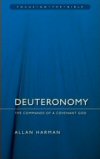
Deuteronomy: The Commands of a Covenant God
- Author: Allan M. Harman
- Publisher: Christian Focus
- Publication Date: 2007
- Pages: 320
For each section of the Bible, the Focus on the Bible Commentaries summarize the passage of Scripture, including the intentions of the authors, the historical and cultural environment, and the questions and issues raised by a particular passage. But most importantly, the Focus on the Bible Commentaries brings you into the heart of the Bible, by explaining Scripture in an accessible way that makes sense for daily Christian living.
The word ‘Deuteronomy’ is a misnomer. It means ‘the second law’. The name is taken from Deuteronomy 17:18 where the expression really means having a copy of the law. Deuteronomy is therefore not a second, different law, but a renewal of the covenant made on Mount Sinai. For a people on the brink of entering the Promised Land, Deuteronomy confirmed God’s gracious promises as they prepared for new horizons and adventures.
For more details on this resource, see here!
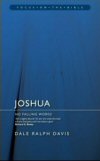
Joshua: No Falling Words
- Author: Dale Ralph Davis
- Publisher: Christian Focus
- Volumes: 2008
- Pages: 208
For each section of the Bible, the Focus on the Bible Commentaries summarize the passage of Scripture, including the intentions of the authors, the historical and cultural environment, and the questions and issues raised by a particular passage. But most importantly, the Focus on the Bible Commentaries brings you into the heart of the Bible, by explaining Scripture in an accessible way that makes sense for daily Christian living.
This exposition is rooted first in a thorough analysis of the Hebrew text, employing helpful insights from archaeology and linguistics, and second in the major theological and literary themes discovered in each section. Finally the author brings the fragments together in an expository treatment which addresses the important topics of application.
For more details on this resource, see here!

Judges: Such a Great Salvation
- Author: Dale Ralph Davis
- Publisher: Christian Focus
- Publication Date: 2006
- Pages: 240
For each section of the Bible, the Focus on the Bible Commentaries summarize the passage of Scripture, including the intentions of the authors, the historical and cultural environment, and the questions and issues raised by a particular passage. But most importantly, the Focus on the Bible Commentaries brings you into the heart of the Bible, by explaining Scripture in an accessible way that makes sense for daily Christian living.
The Church has a problem with the book of Judges. It is so earthy, puzzling, primitive and violent—so much so that the Church can barely stomach it. It falls under the category of “embarrassing scripture.” Such an attitude is, of course, wrong, so Ralph Davis here makes Judges digestible by analyzing the major literary and theological themes discovered in each section, providing a theocentric exposition.
For more details on this resource, see here!

1 Samuel: Looking on the Heart
- Author: Dale Ralph Davis
- Publisher: Christian Focus
- Publication Date: 2007
- Pages: 336
For each section of the Bible, the Focus on the Bible Commentaries summarize the passage of Scripture, including the intentions of the authors, the historical and cultural environment, and the questions and issues raised by a particular passage. But most importantly, the Focus on the Bible Commentaries brings you into the heart of the Bible, by explaining Scripture in an accessible way that makes sense for daily Christian living.
Davis brings cultural and historical color to the task of interpretation and adds a pastor's heart for personal application. You will find a point of contact with the lives of Samuel, Saul, Jonathan and David as Davis answers the question, “What does God seek when he looks on the heart?” Davis presents a simple exposition of the literary and theological character of the text in a bright and fascinating way.
For more details on this resource, see here!
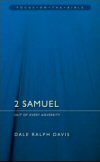
2 Samuel: Out of Every Adversity
- Author: Dale Ralph Davis
- Publisher: Christian Focus
- Publication Date: 2007
- Pages: 336
For each section of the Bible, the Focus on the Bible Commentaries summarize the passage of Scripture, including the intentions of the authors, the historical and cultural environment, and the questions and issues raised by a particular passage. But most importantly, the Focus on the Bible Commentaries brings you into the heart of the Bible, by explaining Scripture in an accessible way that makes sense for daily Christian living.
Davis brings cultural and historical color to the task of interpreting one of the most studied parts of the Bible. The lessons in 2 Samuel from the life of Israel, and David in particular, have obvious modern parallels. Davis writes with a pastor’s heart and the incisive brain of a respected theologian specializing in the Old Testament texts.
For more details on this resource, see here!
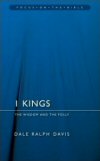
1 Kings: The Wisdom and the Folly
- Author: Dale Ralph Davis
- Publisher: Christian Focus
- Publication Date: 2008
- Pages: 352
For each section of the Bible, the Focus on the Bible Commentaries summarize the passage of Scripture, including the intentions of the authors, the historical and cultural environment, and the questions and issues raised by a particular passage. But most importantly, the Focus on the Bible Commentaries brings you into the heart of the Bible, by explaining Scripture in an accessible way that makes sense for daily Christian living.
1 Kings is a continuation of a narrative of the history of Israel which begins in 1 Samuel and continues through into 1 & 2 Kings. While we so often struggle with the events and issues of the book of 1 Kings, Ralph Davis helps us to see how it we can apply to the contemporary settings of the twenty-first century. As usual, Ralph Davis uses pastoral application and laces it with his own sense of humor. He is noted for tackling scholarship head on.
For more details on this resource, see here!
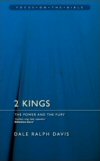
2 Kings: The Power and the Fury
- Author: Dale Ralph Davis
- Publisher: Christian Focus
- Publication Date: 2005
- Pages: 352
For each section of the Bible, the Focus on the Bible Commentaries summarize the passage of Scripture, including the intentions of the authors, the historical and cultural environment, and the questions and issues raised by a particular passage. But most importantly, the Focus on the Bible Commentaries brings you into the heart of the Bible, by explaining Scripture in an accessible way that makes sense for daily Christian living.
2 Kings provides a fast-paced narrative of insight into the history of Israel under its monarchy. This book is a continuation of the narrative begun in 1 Samuel, and continued through 2 Samuel and 1 Kings. Ralph finishes it off with a captivating and rewarding journey through 2 Kings.
Written between 561 B.C. and 538 B.C., 2 Kings gives us a warning about the consequences of sin, especially the catastrophic repercussions of Israel’s love affair with idolatry. Despite struggling with other problems, we see that the Jewish people learned from their experience. They never made a mistake of this enormity again.
Through prophets such as Elisha and Elijah, we see God’s compassion for his people and the opportunity for repentance. An opportunity spoilt by Judah, climaxing with the subjugation of the kingdom by the Babylonians.
Illuminating, accessible, and laced with his unique sense of humor, Davis’ practical devotional expository applies events to the contemporary reader providing parallels to alert us in the twenty-first century.
For more details on this resource, see here!
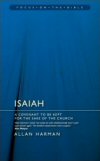
Isaiah: A Covenant to Be Kept for the Sake of the Church
- Author: Allan M. Harman
- Publisher: Christian Focus
- Publication Date: 2005
- Pages: 480
For each section of the Bible, the Focus on the Bible Commentaries summarize the passage of Scripture, including the intentions of the authors, the historical and cultural environment, and the questions and issues raised by a particular passage. But most importantly, the Focus on the Bible Commentaries brings you into the heart of the Bible, by explaining Scripture in an accessible way that makes sense for daily Christian living.
Isaiah has been called the “fifth gospel.” Why? Because in it, God speaks through his prophet of his people’s departure from truth, the need for repentance, and the redemption provided by a coming Savior. Isaiah’s imagery is some of the most beautiful, and terrifying, in the Bible.
It was written in the eight century B.C. at a time of material prosperity. This wealth had brought increased literacy and so God’s people could be brought back by a book of 66 chapters to understand a world that had spiritual, as well as physical, dimensions.
This is a key Old Testament book, as well as charting a key change in the life of God’s people it provides some of the most important prophecies fulfilled only in the life of Jesus of Nazareth. Its lessons for the contemporary church are particularly apt.
Too often modern commentaries become a discussion between commentators rather than an exploration of what the text has to say to contemporary readers. Allan Harman’s methods follow those of Leon Morris and Allan McRae in that he devotes most of his energy to discovering what God is saying through his prophet, rather than what we are saying amongst ourselves.
For more details on this resource, see here!
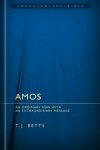
Amos: An Ordinary Man with an Extraordinary Message
- Author: T.J. Betts
- Publisher: Christian Focus
- Publication Date: 2011
- Pages: 208
For each section of the Bible, the Focus on the Bible Commentaries summarize the passage of Scripture, including the intentions of the authors, the historical and cultural environment, and the questions and issues raised by a particular passage. But most importantly, the Focus on the Bible Commentaries brings you into the heart of the Bible, by explaining Scripture in an accessible way that makes sense for daily Christian living.
Amos had no claim to fame. He was not even a son of a prophet. Neither had he had any formal training to be a prophet. Yet God called him out from a career of being a herdsman. He was sent out from the south to bring the Lord’s message to Samaria in the Northern Kingdom. Amos was called to speak at the time of national disunity, military superiority, economic prosperity, and religious activity. Amos brings home the idea of a famine. However it is not food the people lack like we might expect, but there is a famine of the Word of God. Through this study you will be reminded of the importance of the Word of God in your lives.
For more details on this resource, see here!
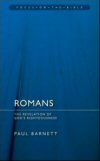
Romans: The Revelation of God's Righteousness
- Author: Paul Barnett
- Publisher: Christian Focus
- Publication Date: 2007
- Pages: 384
For each section of the Bible, the Focus on the Bible Commentaries summarize the passage of Scripture, including the intentions of the authors, the historical and cultural environment, and the questions and issues raised by a particular passage. But most importantly, the Focus on the Bible Commentaries brings you into the heart of the Bible, by explaining Scripture in an accessible way that makes sense for daily Christian living.
Dale Leschert has written, "Paul’s epistle to the Romans may possibly be the most influential letter ever written. Apart from its immediate impact upon the first century, it has indirectly altered the direction of the church and secular history through its instrumentality in the conversion of several of Christianity’s most outstanding leaders." Augustine, Luther and Wesley are among those who relate their trust in Christ to this book.
Romans is all about the revelation of God’s righteousness in freely offering salvation to all people through faith. Written about AD 56 or 57 in Corinth while Paul was on his way to Jerusalem, Romans historically fits into the book of Acts near the end of Paul’s third missionary journey.
For more details on this resource, see here!
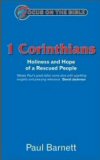
1 Corinthians: Holiness and Hope of a Rescued People
- Author: Paul Barnett
- Publisher: Christian Focus
- Publication Date: 2004
- Pages: 320
For each section of the Bible, the Focus on the Bible Commentaries summarize the passage of Scripture, including the intentions of the authors, the historical and cultural environment, and the questions and issues raised by a particular passage. But most importantly, the Focus on the Bible Commentaries brings you into the heart of the Bible, by explaining Scripture in an accessible way that makes sense for daily Christian living.
First Corinthians is Paul’s masterly pastoral letter to a church, which he founded five years earlier, but which in the meantime has lost its way. In Ephesus, Paul was visited by various groups from Corinth bringing disturbing reports of recent developments, but also a list of questions. A little sleuthing helps us recover an idea of the problems in Corinth as well as the questions to which they wanted answers. A less imaginative person may have simply addressed the problems and replied to the questions, but not Paul. Paul discerned in the problems and the questions five underlying issues:
- True wisdom
- Sexual holiness
- Temple attendance
- Behavior at church meetings
- Resurrection hope
This letter is both timely and timeless. It was, doubtless, piercingly relevant for the Corinthians as they sat transfixed listening as it was read to them. But the letter continues to challenge readers today as they apply its principles to life in an increasingly unstable and hostile world—as Corinth was.
For more details on this resource, see here!
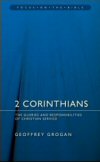
2 Corinthians: The Glories and Responsibilities of Christian Service
- Author: Geoffrey Grogan
- Publisher: Christian Focus
- Publication Date: 2007
- Pages: 336
For each section of the Bible, the Focus on the Bible Commentaries summarize the passage of Scripture, including the intentions of the authors, the historical and cultural environment, and the questions and issues raised by a particular passage. But most importantly, the Focus on the Bible Commentaries brings you into the heart of the Bible, by explaining Scripture in an accessible way that makes sense for daily Christian living.
The second letter to the Corinthians is Paul’s personal appeal to the church he founded in Corinth, a church influenced against Paul by false prophets. In describing the type of church leader that is pleasing to God, Paul reveals more about himself than in any other of his writings. It is as if we can see into his soul as he lovingly points out the faulty attitudes of the church at Corinth.
In addition to guidance on leadership and on other subjects, he also wrote about Christian giving. Paul was eager for the church to participate in the relief fund he was putting together for poor believers in Jerusalem. His rulings on these matters need to be applied to today’s church.
For more details on this resource, see here!
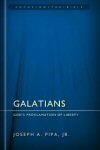
Galatians: God’s Proclamation of Liberty
- Author: Joseph A. Pipa Jr.
- Publisher: Christian Focus
- Publication Date: 2011
- Pages: 272
For each section of the Bible, the Focus on the Bible Commentaries summarize the passage of Scripture, including the intentions of the authors, the historical and cultural environment, and the questions and issues raised by a particular passage. But most importantly, the Focus on the Bible Commentaries brings you into the heart of the Bible, by explaining Scripture in an accessible way that makes sense for daily Christian living.
The glorious doctrine of justification by faith far exceeds even the great charters of freedom and liberty which we have seen throughout history. This doctrine is expounded by the apostle Paul in Galatians, and in it we see the key themes of his theology expounded. Joseph Pipa, an able Biblical expositor committed to the inerrancy of Scripture, brings us this important letter with practical lessons for the church.
For more details on this resource, see here!

Philippians
- Author: Hywel R. Jones
- Publisher: Christian Focus
- Publication Date: 1993
- Pages: 160
For each section of the Bible, the Focus on the Bible Commentaries summarize the passage of Scripture, including the intentions of the authors, the historical and cultural environment, and the questions and issues raised by a particular passage. But most importantly, the Focus on the Bible Commentaries brings you into the heart of the Bible, by explaining Scripture in an accessible way that makes sense for daily Christian living.
The church at Philippi evidently had a lot going for it. Paul was full of joy because of what was happening there; they were energetic in evangelism and demonstrated the power of the gospel through their lives. However, like all churches and indeed all Christians, it was not perfect—needing among other things to be challenged, warned, and prayed for. For Christians today, there is a lot to be learned from the people in Philippi, particularly with regard to the enjoyment they had in living and proclaiming their faith. The challenges set them by Paul and the encouragement he gave them are both areas where Christians today can and should learn from.
For more details on this resource, see here!
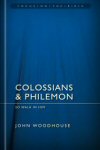
Colossians and Philemon: So Walk in Him
- Author: John Woodhouse
- Publisher: Christian Focus
- Publication Date: 2011
- Pages: 320
For each section of the Bible, the Focus on the Bible Commentaries summarize the passage of Scripture, including the intentions of the authors, the historical and cultural environment, and the questions and issues raised by a particular passage. But most importantly, the Focus on the Bible Commentaries brings you into the heart of the Bible, by explaining Scripture in an accessible way that makes sense for daily Christian living.
Come and hear a wonderful story of evangelism, church planting, and Christian growth. Colossians was a letter which would have first been read by Tychicus in Philemon’s house in Colossae. People who were to read that letter had been converted as a result of Paul’s teaching in Ephesus (Acts 19). As they read they were about to better understand the reality of life in Christ and reading it years later, we can too.
You will see the power of fellowship at work as a formerly useless slave and his master are brought together to work together as brothers in the Lord.
For more details on this resource, see here!
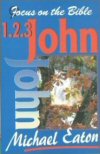
1, 2, 3 John
- Author: Michael Eaton
- Publisher: Christian Focus
- Publication Date: 2001
- Pages: 240
For each section of the Bible, the Focus on the Bible Commentaries summarize the passage of Scripture, including the intentions of the authors, the historical and cultural environment, and the questions and issues raised by a particular passage. But most importantly, the Focus on the Bible Commentaries brings you into the heart of the Bible, by explaining Scripture in an accessible way that makes sense for daily Christian living.
Michael Eaton believes that John’s epistles were written to counteract false teachers who were influencing Christians in the church. An exposition of these epistles could not be timelier, as often people who come to Christ today have little or no church background—they can be easily influenced by false teaching.
John showed in his letters that the most secure way to avoid being deceived was the importance of having a present experience of knowing the Father and the Son. Michael Eaton brings out this balanced approach to help give us healthy and fruitful church members.
For more details on this resource, see here!

The Epistle to the Romans
- Author: John Murray
- Publisher: Eerdmans
- Publication Date: 1997
- Volumes: 2
- Pages: 740
In this acclaimed commentary on Romans, John Murray provides rich biblical insight, meticulously-researched background information, and highly accessible writing on one of the most challenging New Testament books. The Epistle to the Romans was a ground-breaking work when first written, and remains highly valued for its scholarship, offering expert notes on difficult passages. Equip your study of this doctrinally-rich epistle with Murray’s focused and thought-provoking exegesis covering Romans verse by verse. This timeless two-volume set is a fantastic addition to the library of any biblical scholar, pastor, Bible teacher, and lay person. All who wish to glean more from Romans than ever before will find Murray’s volume a valuable study companion.
Titles included:
- The Epistle to the Romans, vol. 1
- The Epistle to the Romans, vol. 2
For more details on this collection, see here!
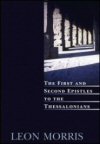
The First and Second Epistles to the Thessalonians
- Author: Leon Morris
- Series: New International Commentary on the New Testament (NICNT)
- Publisher: Eerdmans
- Publication Date: 1991
- Pages: 278
In The First and Second Epistles to the Thessalonians, noted theologian Leon Morris introduces the reader to the Church at Thessalonica, then provides stirring verse-by-verse commentary for Paul’s epistles directed there. Morris’ indispensable commentary is at the forefront of Thessalonian studies—a great addition to the library of any theologian, biblical scholar, student of the Bible, or layperson.
The solid exegesis contained in this volume was the original New International Commentary on the New Testament work on 1 & 2 Thessalonians.
For more details on this resource, see here!
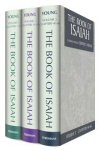
The Book of Isaiah
- Author: Edward J. Young
- Series: New International Commentary on the Old Testament (NICOT)
- Publisher: Eerdmans
- Publication Date: 1972
- Volumes: 3
- Pages: 1,681
Edward J. Young’s classic three-volume commentary engages in a line-by-line exegesis of the Book of Isaiah, setting interpretation firmly in the context of Isaiah’s archaeological, cultural, and intellectual background. Young allows the prophet to speak for himself and to expound his message for the present age. Written primarily for the minister, Sunday school teacher and general layperson, the theologically conservative commentary provides very few Hebrew words in the main body of the text. However, in order to serve those pastors, teachers and students who do know the Hebrew language, Young has provided technical material in the footnotes or in special notes.
Dr. Young firmly believes Isaiah to be a unified, single-author book, although he respectfully interacts with opposing views. As an Old Testament scholar he concentrates primarily on the meaning of the text rather than on specific textual problems. He uses his own semiliteral translation of the Hebrew throughout the commentary in order to express the force of the original, thereby giving the reader a fuller understanding of the prophet’s message. It is the author’s hope that this commentary will “encourage men and women to read the Old Testament and to encourage ministers to preach therefrom.”
Titles included:
- The Book of Isaiah, vol. 1
- The Book of Isaiah, vol. 2
- The Book of Isaiah, vol. 3
For more details on this collection, see here!
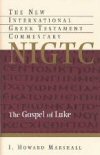
The New International Greek Testament Commentary: The Gospel of Luke
- Author: I. Howard Marshall
- Publisher: Eerdmans
- Publication Date: 1978
- Pages: 928
This commentary series is established on the presupposition that the theological character of the New Testament documents calls for exegesis that is sensitive to theological themes as well as to the details of the historical, linguistic, and textual context. Such thorough exegetical work lies at the heart of these volumes, which contain detailed verse-by-verse commentary preceded by general comments on each section and subsection of the text.
An important aim of the NIGTC authors is to interact with the wealth of significant New Testament research published in recent articles and monographs. In this connection the authors make their own scholarly contributions to the ongoing study of the biblical text.
The text on which these commentaries are based is the UBS Greek New Testament, edited by Kurt Aland and others. While engaging the major questions of text and interpretation at a scholarly level, the authors keep in mind the needs of the beginning student of Greek as well as the pastor or layperson who may have studied the language at some time but does not now use it on a regular basis.
In this acclaimed commentary—the first in the English language on the Greek text of Luke since those of J. M. Creed in 1930 and H. K. Luce in 1933—renowned New Testament scholar I. Howard Marshall calls special attention to the theological message of Luke the Evangelist. His primary purpose is to exegete the text as it was written by Luke, so that the distinctiveness of Luke’s Gospel may be seen.
While basing his commentary on the UBS Greek New Testament, Marshall also refers to many variant readings that are significant in this study. He provides information on the meaning of the Greek words used by Luke and shows which words and constructions occur frequently and are therefore characteristic of his style. It is by this meticulous analysis of the Greek that Luke’s theological intentions can be objectively determined.
Widely considered to be one of the best commentaries on Luke currently available, Marshall’s work provides the tools needed for the scholarly study of this Gospel—meeting in particular the needs of students of the Greek text—describes the contemporary state of Lucan research, and makes its own important contributions to the understanding of Luke.
For more details on this resource, see here!
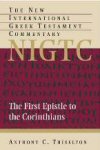
The New International Greek Testament Commentary: The First Epistle to the Corinthians
- Author: Anthony C. Thiselton
- Publisher: Eerdmans
- Publication Date: 2000
- Pages: 1,479
This commentary series is established on the presupposition that the theological character of the New Testament documents calls for exegesis that is sensitive to theological themes as well as to the details of the historical, linguistic, and textual context. Such thorough exegetical work lies at the heart of these volumes, which contain detailed verse-by-verse commentary preceded by general comments on each section and subsection of the text.
An important aim of the NIGTC authors is to interact with the wealth of significant New Testament research published in recent articles and monographs. In this connection the authors make their own scholarly contributions to the ongoing study of the biblical text.
The text on which these commentaries are based is the UBS Greek New Testament, edited by Kurt Aland and others. While engaging the major questions of text and interpretation at a scholarly level, the authors keep in mind the needs of the beginning student of Greek as well as the pastor or layperson who may have studied the language at some time but does not now use it on a regular basis.
This superb volume in the New International Greek Testament Commentary series provides the most detailed, definitive, and distinctive commentary on 1 Corinthians available in English to date.
One of the world’s most respected Christian theologians, Anthony Thiselton here provides in-depth discussion of the language of 1 Corinthians, presents his own careful translation of the Greek, traces the main issues of interpretation from the church fathers to the present, and highlights topics of theological, ethical, and sociohistorical interest today, including ethics and “rights,” marriage, divorce and remarriage, “headship,” gender, prophecy, and many others.
No other commentary on 1 Corinthians embodies the wealth and depth of detail presented in Thiselton’s work, which takes account of nearly all scholarly research on 1 Corinthians and incorporates substantial bibliographies throughout. In his commentary Thiselton indeed addresses virtually every question that thoughtful, serious readers—scholars, students, pastors, teachers—may wish to ask of or about the text of 1 Corinthians. His work truly offers a fresh, comprehensive, and original contribution to our understanding of this major epistle and its contemporary relevance.
For more details on this resource, see here!
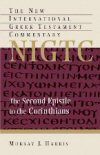
The New International Greek Testament Commentary: The Second Epistle to the Corinthians
- Author: Murray J. Harris
- Publisher: Eerdmans
- Publication Date: 2005
- Pages: 1,072
This commentary series is established on the presupposition that the theological character of the New Testament documents calls for exegesis that is sensitive to theological themes as well as to the details of the historical, linguistic, and textual context. Such thorough exegetical work lies at the heart of these volumes, which contain detailed verse-by-verse commentary preceded by general comments on each section and subsection of the text.
An important aim of the NIGTC authors is to interact with the wealth of significant New Testament research published in recent articles and monographs. In this connection the authors make their own scholarly contributions to the ongoing study of the biblical text.
The text on which these commentaries are based is the UBS Greek New Testament, edited by Kurt Aland and others. While engaging the major questions of text and interpretation at a scholarly level, the authors keep in mind the needs of the beginning student of Greek as well as the pastor or layperson who may have studied the language at some time but does not now use it on a regular basis.
The reputation of the NIGTC series is so outstanding that the appearance of each new volume is noteworthy. This book on 2 Corinthians is no exception. Master New Testament exegete Murray J. Harris has produced a superb commentary that analyzes the Greek text verse by verse against the backdrop of Paul’s tumultuous relations with his converts at Corinth.
Believing that Scripture cannot be understood theologically unless it has first been understood grammatically, Harris provides a careful, thoroughgoing reading of the text of 2 Corinthians. He gives special attention to matters of translation, making regular references not only to the standard modern English translations but also to influential older versions such as The Twentieth Century New Testament and those by Weymouth, Moffatt, and Goodspeed. His close attention to matters of textual criticism and grammar leads to discussions of the theology of 2 Corinthians that show the relevance of Paul’s teaching to Christian living and church ministry.
Other notable features of the book include a comprehensive introduction in which all the relevant literary and historical issues are discussed, an expanded paraphrase of the letter that conveniently shows Harris’s decisions on exegetical issues and indicates the flow of Paul’s argument, a chronology of the relations of Paul, Timothy, and Titus with the Corinthian church, and an excursus on Paul’s “affliction in Asia” (1:8-11) and its influence on his outlook and theology.
For more details on this resource, see here!
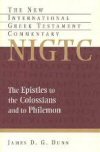
The New International Greek Testament Commentary: The Epistles to the Colossians and to Philemon
- Author: James D.G. Dunn
- Publisher: Eerdmans
- Publication Date: 1996
- Pages: 405
This commentary series is established on the presupposition that the theological character of the New Testament documents calls for exegesis that is sensitive to theological themes as well as to the details of the historical, linguistic, and textual context. Such thorough exegetical work lies at the heart of these volumes, which contain detailed verse-by-verse commentary preceded by general comments on each section and subsection of the text.
An important aim of the NIGTC authors is to interact with the wealth of significant New Testament research published in recent articles and monographs. In this connection the authors make their own scholarly contributions to the ongoing study of the biblical text.
The text on which these commentaries are based is the UBS Greek New Testament, edited by Kurt Aland and others. While engaging the major questions of text and interpretation at a scholarly level, the authors keep in mind the needs of the beginning student of Greek as well as the pastor or layperson who may have studied the language at some time but does not now use it on a regular basis.
For more details on this resource, see here!
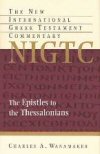
The New International Greek Testament Commentary: The Epistles to the Thessalonians
- Author: Charles A. Wanamaker
- Publisher: Eerdmans
- Publication Date: 1990
- Pages: 344
This commentary series is established on the presupposition that the theological character of the New Testament documents calls for exegesis that is sensitive to theological themes as well as to the details of the historical, linguistic, and textual context. Such thorough exegetical work lies at the heart of these volumes, which contain detailed verse-by-verse commentary preceded by general comments on each section and subsection of the text.
An important aim of the NIGTC authors is to interact with the wealth of significant New Testament research published in recent articles and monographs. In this connection the authors make their own scholarly contributions to the ongoing study of the biblical text.
The text on which these commentaries are based is the UBS Greek New Testament, edited by Kurt Aland and others. While engaging the major questions of text and interpretation at a scholarly level, the authors keep in mind the needs of the beginning student of Greek as well as the pastor or layperson who may have studied the language at some time but does not now use it on a regular basis.
The letters of Paul to the newly founded Christian community at Thessalonica hold a special place within the Christian tradition as possibly the earliest extant Christian writings. They are also of special interest not only for their theological value but for their sociological context. Among the communities established by Paul, the church at Thessalonica appears to have been the only one to have suffered serious external oppression. These two important epistles, then, speak uniquely to contemporary Christians living in a society often ideologically, if not politically, opposed to Christian faith.
In this innovative commentary Charles A. Wanamaker incorporates what may he called a social science approach to the study of 1 and 2 Thessalonians, taking into full account the social context that gave rise to Paul’s correspondence. While Wanamaker in no way ignores traditional historical-critical, linguistic, literary, and theological approaches to writing a commentary—in fact, at several points he makes a significant contribution to the questions raised by traditional exegesis—at the same time he goes beyond previous commentaries on the Thessalonian correspondence by taking seriously the social dimensions both of Christianity at Thessalonica and of the texts of 1 and 2 Thessalonians themselves. In blending traditional exegetical methods with this newer approach, Wanamaker seeks to understand Pauline Christianity at Thessalonica as a socio-religious movement in the first-century Greco-Roman world and attempts to grasp the social character and functions of Paul’s letters within this context.
A significant and original addition to the literature on 1 and 2 Thessalonians, this commentary will be valuable to scholars, pastors, and students alike.
For more details on this resource, see here!
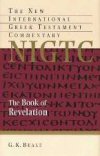
The New International Greek Testament Commentary: The Book of Revelation
- Author: G.K. Beale
- Publisher: Eerdmans
- Publication Date: 1999
- Pages: 1,240
This commentary series is established on the presupposition that the theological character of the New Testament documents calls for exegesis that is sensitive to theological themes as well as to the details of the historical, linguistic, and textual context. Such thorough exegetical work lies at the heart of these volumes, which contain detailed verse-by-verse commentary preceded by general comments on each section and subsection of the text.
An important aim of the NIGTC authors is to interact with the wealth of significant New Testament research published in recent articles and monographs. In this connection the authors make their own scholarly contributions to the ongoing study of the biblical text.
The text on which these commentaries are based is the UBS Greek New Testament, edited by Kurt Aland and others. While engaging the major questions of text and interpretation at a scholarly level, the authors keep in mind the needs of the beginning student of Greek as well as the pastor or layperson who may have studied the language at some time but does not now use it on a regular basis.
This monumental new study of the book of Revelation will be especially helpful to scholars, pastors, students, and others seriously interested in interpreting the Apocalypse for the benefit of the church. Too often Revelation is viewed as a book only about the future. As G. K. Beale shows, however, Revelation is not merely a futurology but a book about how the church should live for the glory of God throughout the ages—including our own.
Engaging important questions concerning the interpretation of Revelation in scholarship today, as well interacting with the various viewpoints scholars hold on these issues, Beale’s work makes a major contribution in the much-debated area of how the Old Testament is used in the Apocalypse. Approaching Revelation in terms of its own historical background and literary character, Beale argues convincingly that John’s use of Old Testament allusions—and the way the Jewish exegetical tradition interpreted these same allusions—provides the key for unlocking the meaning of Revelation’s many obscure metaphors. In the course of Beale’s careful verse-by-verse exegesis, which also untangles the logical flow of John’s thought as it develops from chapter to chapter, it becomes clear that Revelation’s challenging pictures are best understood net by apparent technological and contemporary parallels in the twentieth century but by Old Testament and Jewish parallels from the distant past.
For more details on this resource, see here!
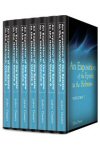
An Exposition of the Epistle to the Hebrews
- Author: John Owen
- Publication Date: 1862
- Volumes: 7
- Pages: 3,967
Equip your study of an often challenging New Testament book with John Owen’s Exposition of the Epistle to the Hebrews—one of the richest commentaries ever written on the book of Hebrews. This massive 7-volume commentary includes two volumes of introductory essays on historical and theological topics relating to Hebrews, along with five volumes of meticulous exposition and commentary.
Owen’s work on Hebrews is partly critical—with comments on the text and language—and partly doctrinal, containing ample discussion of theology and doctrine. His commentary weaves together Old Testament themes of law and covenant with a New Testament definition of Christ’s priestly function and God’s new covenant of grace. Most importantly, Owen’s emphasis on holiness makes An Exposition of the Epistle to the Hebrews eminently useful for practical Christian study and reflection.
This vast work—almost 4,000 pages and over two million words—reflects Owen’s careful inquiry and stunning mastery of the text, and vindicates Owen’s own claim that “this epistle is as useful to the church as the sun is to the world.” An Exposition of the Epistle to the Hebrews is the result of earnest investigation and deep exploration of the theological topics in the book of Hebrews. In fact, Owen’s theology—here and elsewhere—remains so biblically rooted, and his exegesis and exposition so practically theological, that where one ends and the other begins is not plainly evident.
For more details on this collection, see here!
Reviews
7 ratings

Forrest Cole
11/9/2021
Donald J Mills
8/31/2020
Peter Mark Wallace
12/24/2016

Andrew Anderson
8/28/2016
Reg Givens
12/31/2015

REV. DR. JAIME LOPEZ ORTEGA
7/3/2015
this set is massive... wow... I had not realized that I had gotten most of these books one at a time.. when it came time for me to download the reformation bundle it only added one book for a small fee due to dynamic pricing.. individually they cost a bit more but sometimes I cannot do it all at once..
Jeremy Terhune
6/28/2015